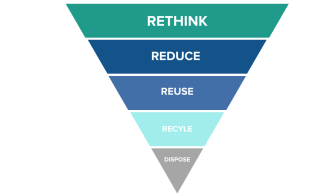
The future of waste
Hospitals generate over 42 pounds of waste per bed per day and produce more than 5 million tons of waste each year.
Hospitals are pouring, burying, burning, and cooking garbage made up of plastics, chemicals, paper, food, needles, packaging, and lots of electronic equipment. With rising waste removal fees, beach wash-ups, medical waste incinerators identified as a major source of mercury in the environment, and pharmaceutical waste in the country’s drinking water, it’s undeniable that waste is a problem for the health of patients, communities, and the planet. Improper health care waste management may expose health workers and surrounding communities to direct threats from waste and air pollution. Safe, sustainable health care waste management is a critical concern for those charged with protecting public health.
We draw from best practices from hospitals across the country and the world to provide a wealth of tools and resources for health care to minimize the volume of waste generated, reduce the toxicity of waste by making smarter purchasing decisions upstream, and properly segregate and recycle waste.
Support and guidance for your facility
Our partner organization, Practice Greenhealth, draws from best practices from hospitals across the country and the world to provide a wealth of tools and resources for health care to minimize the volume of waste generated, reduce the toxicity of waste by making smarter purchasing decisions upstream, and properly segregate and recycle waste.
Act now
Innovative strategies are transforming waste management
The waste hierarchy framework is helping health care facilities conserve resources and minimize waste. The hierarchy allows you to rethink the need for products and discover where you can reuse, repair, or repurpose products, along with waste treatment options like composting and recycling thereby reducing the need for disposal and overall waste.

Smarter purchasing, safer product design
One important strategy for waste management is product design and supplier interaction. Our focus on sustainable procurement and safer chemicals can shift the market by putting pressure on suppliers to embed sustainability and justice into what we buy by making safer, more sustainable health care products.
Practice Greenhealth’s groundbreaking sustainable procurement guide features stories from 25 health care organizations around the globe, offering a roadmap for developing a sustainable purchasing strategy that prioritizes community and environmental health and safety while reducing costs.
Our partner hospitals facilitate the purchasing of products that meet our standardized environmental criteria and achieve safer materials benchmarks. The Greenhealth Approved seal makes it easier for hospitals to identify and select products that meet their goals.
Toxic-free future
Substances that are carcinogenic, mutagenic, toxic, or hazardous should be excluded from products and services, and sustainable procurement is the key. Materials containing toxic chemicals should not be recycled to prevent legacy toxics from contaminating new products.
Transition from disposables to reusables
Our priority reusable products used in health care guidance helps hospitals transition from disposables to reusables for products across 10 reusable supply categories.
Minimize vaccine waste
Our three COVID-19 waste reduction strategy guides offer guidance for setting up successful immunization programs using innovative practices to reduce waste and provide a framework for safely processing hazardous materials.
Minimize waste and supply costs in the operating room
Operating rooms (ORs) are responsible for 40-60% of an organization’s total supply costs, producing more than 30% of a facility’s waste and two-thirds of its regulated medical waste. Partner hospitals and health systems utilize Practice Greenhealth’s greening the OR resources to design and implement climate-smart, sustainable strategies to reduce OR supply costs and waste.
End waste incineration
Incineration – including waste to energy, pyrolysis, chemical recycling, and related technologies – is harmful to health and should be phased out. Medical waste incineration is a leading source of dioxin, mercury, lead, and other harmful pollutants that threaten human health and the environment. Health Care Without Harm catalyzed the closure of more than 4,400 carcinogenic medical waste incinerators, helping hospitals save money, reuse materials, reprocess surgical supplies, and utilize alternative waste treatment strategies.
Minimize food waste
An estimated 10-15% of the waste an average hospital creates is food waste. Reducing food losses by just 15% would provide enough food for more than 25 million people living in the United States every year. By procuring food in ways that reduce the amount that goes uneaten, recycling food waste through composting or anaerobic digestion, and donating uneaten food to community nonprofits, health care organizations can reduce their food waste, waste management costs, and climate impact.
The "forecaring" principle
More commonly known as "the polluter pays," this philosophy posits that producers have an extended responsibility for waste. Industries – such as the pharmaceutical industry or those manufacturing single-use plastic products – should share responsibility and costs for the collection, reuse, recycling, safe treatment, and disposal of their products. This philosophy is growing in popularity and can be a valuable policy change recommendation health care professionals can advocate for.